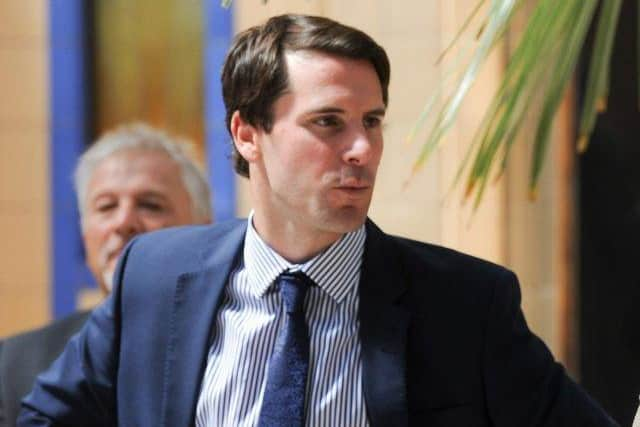Nationality and Borders Bill: Illegal immigration 'angers constituents more than any other' element, says Blackpool South MP Scott Benton
and live on Freeview channel 276
Conservative MP Scott Benton spoke in support of Home Secretary Priti Patel s Nationality and Borders Bill, which was brought to Parliament earlier this month, progressing to a second reading yesterday.
Legislation within the Bill addresses proposed issues with immigration in the UK, and looks to make it harder for migrants to enter the country illegally.
Advertisement
Hide AdAdvertisement
Hide AdThe Bill is part of the Government’s New Plan for Immigration, which says it is to prioritise those in most need of protection while stopping the abuse of the system.


Speaking at the debate in the House of Commons yesterday, Mr Benton said: "Immigration puts pressure on our schools, the NHS and housing, while also challenging our identity and values when it is not properly controlled and when new arrivals do not integrate within their new communities."
He sought to support Ms Patel's proposed legislation, which aims to "increase the fairness of our system so that we can better protect those who are in need of genuine asylum."
Ms Patel added: "It will deter illegal entry to the UK, and, importantly, will break the business model of the smuggling gangs and protect the lives of those whom they are endangering."
Advertisement
Hide AdAdvertisement
Hide AdMr Benton told the House: "The element that is most emotive and that angers my constituents more than any other is illegal immigration - specifically, the thousands of small boats arriving on the south coast.
"It is high time this Bill was brought forward to tackle the scourge of illegal immigration, and I strongly welcome the measures outlined within it. Giving our Border Force additional powers to turn around boats crossing the channel, making it a criminal offence to knowingly arrive in the UK without permission and introducing life sentences for people smugglers will all reduce the number of migrants making the unnecessary and illegal crossing in small boats."
The MP believed not enough had been done by previous Governments to tackle immigration, "perhaps through fear of facing the cancel culture of the woke brigade."
He added that if people are refused asylum, they should be "swiftly deported," and slammed the appeals process, which is "submitted and encouraged by left-wing human rights lawyers - [and] are done at tremendous cost to the UK taxpayer."
Advertisement
Hide AdAdvertisement
Hide Ad"It is encouraging that this Bill will overhaul the legal system for asylum claims, finally putting an end to this utter nonsense. If people have no right to be here, they should be swiftly deported, it is as simple as that," Mr Benton said.
He told the Gazette: "It’s extremely disappointing that the Labour Party will be voting against a Bill which is designed to stop illegal immigration and deal with the £1 billion cost of our broken asylum system."
But Dr Lucy Mayblin, a political sociologist and lecturer at Sheffield University, said "refugees will in all cases be the losers" if the Bill is passed.
"The Bill contains both unworkable plans which will likely not be realised, and workable plans which will likely happen," she continued.
Advertisement
Hide AdAdvertisement
Hide Ad"Not that many people are arriving, those who do arrive have to deal with an inefficient and opaque bureaucracy within a system designed to limit success, and yet still most have such compelling cases that they are given refugee status."
What is the Nationality and Borders Bill?
The Nationality and Borders Bill was brought to Parliament by Home Secretary Priti Patel on July 6.
It aims to increase the fairness of our system so that we can better protect and support those in genuine need of asylum, and stop people entering the UK illegally.
The Bill also aims to tackle the issues of "smuggling gangs," and Ms Patel vowed to crack down on "foreign criminals – including murderers and rapists – who abuse our laws and then game the system so [we] can’t remove them."
Advertisement
Hide AdAdvertisement
Hide AdMs Patel said "people should be claiming asylum in the first safe country they reach, and not using the UK as a destination of choice," and the legislation within the Bill aims to "smash the criminal gangs who cause such misery" and break their business model.
Border Force would also be given more control, including permission to seize vessels used to facilitate illegal entry to the UK, and search all freight for people suspected of seeking illegal entry.
Anyone bringing people into the country illegally would face a life sentence, and the maximum prison sentence for entering the country illegally would also rise from six months to four years.
What is a second reading?
A second reading is the first opportunity for MPs to debate the main principles of a proposed Bill.
Advertisement
Hide AdAdvertisement
Hide AdThe government minister, spokesman or MP responsible for the Bill opens the second reading debate, and the official opposition spokesman responds with their views on it.
The debate then continues with other Opposition parties and backbench MPs giving their opinions.
At the end of the debate, the Commons decides whether the Bill should be given its second reading by voting, meaning it can proceed to the next stage - however, it is possible for a Bill to have a second reading with no debate - as long as MPs agree to its progress.
After the second reading, the Bill proceeds to committee stage - where each clause (part) and any amendments (proposals for change) to the Bill may be debated.